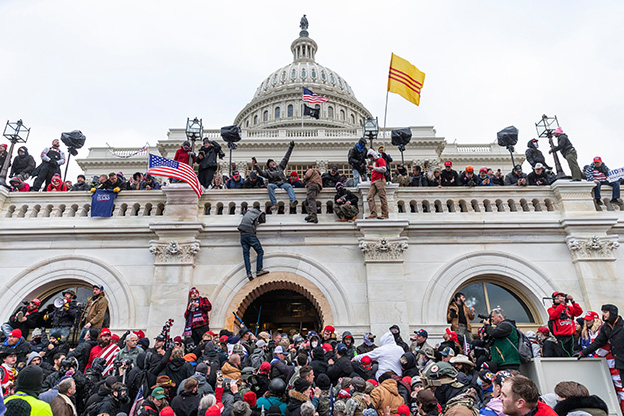New Wave of Gun Owners More Likely to Support Political Violence
Survey finds pandemic gun buyers are also more likely to believe in conspiracies, distrust government
Get all our news
The gun-owner population seems to have a fair amount of power in shaping policy, and you’re getting a population that is moving in a more extreme direction.”
James Druckman
IPR political scientist
 Protestors breached the U.S. Capitol building on January 6, 2020 over the results of the 2020 election.
Protestors breached the U.S. Capitol building on January 6, 2020 over the results of the 2020 election.
A record-breaking 17 million Americans bought one or more guns in 2020, and the gun-buying spike continued into 2021. This new wave of gun owners is more likely to distrust government, believe in conspiracies, and support political violence, a national survey shows.
The research establishes, for the first time, a connection between gun buying during the COVID-19 pandemic and political attitudes and behaviors that challenge the state. Compared to other Americans, new gun owners exhibit strong conspiracy and anti-government beliefs, the research uncovers.
“The gun-owner population seems to have a fair amount of power in shaping policy, and you’re getting a population that is moving in a more extreme direction,” said IPR political scientist James Druckman, who co-authored the working paper.
Between September 2020 and June 2021, Druckman and his colleagues from Columbia University, University of Pennsylvania, and Northeastern University surveyed more than 51,000 individuals in four waves. The researchers examined four behaviors and their connection with gun buying during the pandemic: conspiracy theories, trust in government, protests, and political violence.
The researchers find those who purchased guns during the pandemic were more likely to hold conspiracy beliefs, such as misinformation surrounding the COVID-19 vaccine. In September 2020, 18% of pandemic gun buyers believed U.S. health institutions manufactured the pandemic, compared to just 7% for other Americans—and 25% thought a cure was being withheld from the public compared to 13% for those who did not buy guns.
Gun buyers who hold anti-government views and attend protests are more likely than other pandemic gun buyers to say they bought guns for political reasons and are less likely to trust governmental institutions, the survey reveals. They also are more likely to believe conspiracy theories, especially those pertaining to the fairness of the 2020 election.
In January 2021, 31% of pandemic gun-buyers reported being “not at all confident” in the fairness of the 2020 presidential election, compared to 19.5% for others, and 13.5% believed mask-wearing increased the risk of COVID-19, compared to 7% for others.
Overall, those who bought a gun during the pandemic are less trusting of government, at every level, than those who did not.
The researchers also find that gun buyers, regardless of their party affiliation, trusted Donald Trump, who is known for his support of gun rights, during his presidency. But they were less trusting of President Joe Biden, who supports stricter gun restrictions.
When prompted with a hypothetical question about the use of violence in the case of an unfair election in 2024, only 5% of those who did not buy guns said they somewhat or strongly approved of using violence. Yet three times as many pandemic gun buyers (16.3%) approved of violence. And while only 8% of those not buying guns somewhat or strongly supported the violent Jan. 6 insurrection at the U.S. Capitol, 28% of pandemic gun buyers did.
Among pandemic gun buyers, between 9% and 14% attended a protest in the last six months prior to taking the survey, compared to between 4.6% and 5.3% of those not buying guns. A mere 1% of those not buying guns reported attending a protest about "ending quarantine or lockdown restrictions" in June 2021, compared with 10% of pandemic gun buyers.
Additionally, 9% had attended demonstrations about "overturning unfair election results" versus just 1% for others. Perhaps most surprisingly, 13% of gun buyers reported participating in a protest against racism or police violence but only 4.5% of the other types of protesters did. Perhaps some of these were participating in counterprotests, but the researchers have no data to confirm this.
Using their findings, the scholars concluded that as the number of gun owners increases, the gun owner population is shifting towards more extreme ideologies, which has a palpable impact on democracy. The authors find that gun owners as a group have the means and political power—as well as increased motivation—to act violently against the state and fellow citizens.
These findings indicate that the spike in gun sales is linked to a critical dynamic affecting American democracy, especially when one considers the political power of organizations such as the National Rifle Association (NRA).
The NRA has a long-standing history of advocating for the Second Amendment and pushing for American citizens to arm themselves against a hypothetical tyrannical government. Druckman says the NRA might begin to align with the new wave of gun owners as it leans into conspiracy beliefs and increased support for political violence.
“We potentially expect entities like the NRA to start to endorse and take actions that reflect those kinds of conspiratorial beliefs—beliefs that question government a bit more,” Druckman said.
James Druckman is the Payson S. Wild Professor of Political Science and IPR associate director and fellow.
Photo credit: ShutterStock
Published: May 18, 2023.


